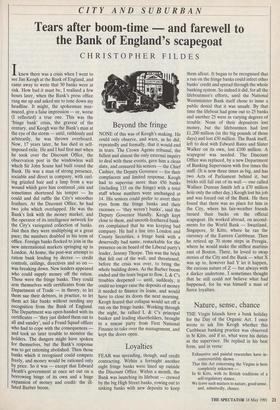Beyond the fringe
NONE of this was of Keogh's making. He could only observe, and warn, as he did, repeatedly and formally, that it would end in tears. The Crown Agents tribunal, the fullest and almost the only external inquiry to deal with these events, gave him a clean slate, and censured his seniors — the Chief Cashier, the Deputy Governor — for their complacent and limited response. Keogh had to supervise more than 450 banks (including 133 on the fringe) with a total staff whose numbers were unchanged at 14. His seniors could prefer to avert their eyes from the fringe banks and their excesses — 'they weren't banks', said the Deputy Governor blandly. Keogh kept close to them, and smooth-feathered bank- ers complained that he was keeping bad company. He had a line into London and County Securities, a fringe bank with a deservedly bad name, remarkable for the presence on its board of the Liberal party's leader, Jeremy Thorpe. This was the brick that fell out of the wall, and threatened, before the crisis was over, to bring the whole building down. As the Barber boom ended and the tears began to flow, L & C's troubles deepened — until, suddenly, it could no longer raise the deposits of money it needed to finance its loans, and would have to close its doors the next morning. Keogh feared that collapse would set off a run on the fringe banks. Working through the night, he rallied L & C's principal banker and leading shareholders, brought in a rescue party from First National Finance to take over the management, and kept the doors open.


























































 Previous page
Previous page